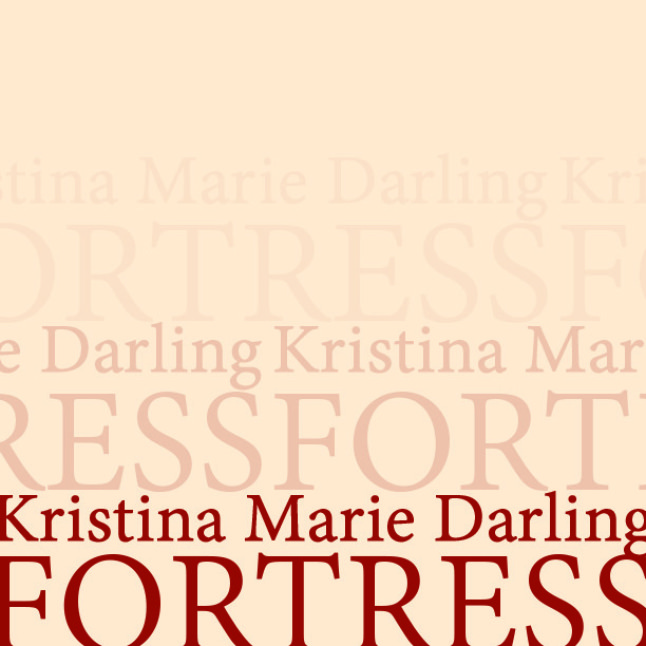
Fortress
Kristina Marie Darling
ISBN: 978-1-939675-13-2
Paperback, 78 pages
Sundress Publications, 2014
$14
Reviewed by Jonathan Russell Clark
In the preface to his 1997 book The Footnote: A Curious History, Anthony Grafton writes that footnotes “offer the empirical support for stories told and arguments presented.”
Like the invisible framework of architecture, footnotes reinforce a text without interrupting it. Kristina Marie Darling’s Fortress exists in that marginalia, her poems relegated to the lower inches of the page. But here there is no main text: Darling’s footnotes reference a story we’re not given. Instead, we must cobble together a narrative from the modifiers.
But the book is more than footnotes. Darling’s Preface and Epilogue are both erasure poems from Elaine Scarry’s The Body in Pain, and they represent, for my money, some the most practically useful and beautifully rendered erasures I’ve ever seen. Take this passage, from the Preface:
this book has only circles, for when we enter into pain it finds a voice, it begins to tell about the larger structures of events happening within the interior of that person's body
Fortress is an examination of romantic suffering; and here, taken from one of the seminal sources on pain, is a perfect and artful introduction to Darling’s pursuit. When Darling enters into pain, she finds a voice.
Book One isn’t made up of footnotes so much as marginalized text. Scrunched into the bottom of the page, Darling’s work in this section reiterates the isolation of the speaker, who recalls details from an unsuccessful marriage. “When we met,” the speaker says, “he said the flowers were for me.” These flowers grow in “sprawling fields” the man tends to. And as time passes, the narrator wonders “if the landscape, rather than affection for one another, had been the source of our enduring euphoria.”
The pain, when it comes, does a lot more than hurt. For the speaker, the loss of love amounts to the loss of life:
To enter the underworld, must I have left this one behind? I can no longer remember what my face looked like or the warmth of his hand through my dress.
When one’s identity gets wrapped up in another person, the loss of that person inevitably feels like a loss of self. Sometimes, in love, we go down with the ship. Darling, though, goes one insight further: in the act of marrying, her speaker loses something of her identity:
What is there left to say? When we married, I became his wife. I can no longer remember what I looked like before that veil descended, or the vow exchanged between us.
Love complicates identity, when you’re in it and when you’ve lost it. Who are we, really? Who is the speaker? The woman who married the man, the woman who existed before she married him, or the woman who lost him?
Then, in Book Two, come the footnotes. Written in a faux academic verisimilitude, the language of this section demonstrates why Darling is such a bold and effective experimenter. She employs the device of footnotes not for unnecessary cleverness or esoteric obliqueness, but for real emotional resonance. The notion of stripping away the text to which footnotes refer is a fascinating conceit (first employed by Jenny Boully in her groundbreaking book The Body (Slope Editions 2002; Essay Press 2007), but one that would feel empty if not used to further the essential project of the work. Here, Darling’s experiment speaks directly to the speaker’s state of mind: to her self-perception as lesser, as small, as a mere footnote to the grander history of life. One footnote captures the spirit of her confusion succinctly:
11. At the end of the novel, found in fragments after the fire, an unnamed heroine asks her keeper if she had ever been free.
The footnotes also typify one of the ways we try to overcome heartbreak: by looking at it through a cold, scholarly lens. The speaker here tries to strip her assessment of the relationship of all emotion, a way to try to get to the bottom of things. She begins to trace a notion of addiction, as if she could explain her ache as a kind of withdrawal:
4. Opiate
1. A drug used to induce sleep.
2. A substance that, once ingested, quiets one’s feelings of uneasiness.
Later, she even invokes the Romantics to figure out what happened:
12. In the work of Keats especially, opium was synonymous with both beauty and ruination.
No amount of literary analysis, though, will fully eradicate such pain.
Fortress is an intensely effective work, one that demonstrates the emotional power of literary subversion. It shows how postmodern techniques (or, rather, postmodernism’s appropriation of techniques) can work in concert with sincerity and truth. The pages in the book are mostly blank; only the notes survive. And, often—in life and in love—that’s all we get, when all is said and done. The pain of heartbreak is wrenching, but the fading images of our memory, like the slow process of a drug wearing off, may be even more devastating. How can we mourn what is gradually disappearing? How do we comment on the story when the story has vanished?
Kristina Marie Darling has produced many volumes of hybrid poetry and prose, each one a fresh attempt to invigorate literature. Her work is as vital, as alive, and as daring as it is incisive. Fortress is about a marriage, but, more than that, it is a marriage–of sophisticated artistry and tender honesty.
Jonathan Russell Clark is a literary critic and fiction writer. He is a regular contributor to The Millions and PANK, and his work has appeared in The Georgia Review, The Rumpus, Colorado Review, Chautauqua, Black Heart Magazine, Thrasher Magazine, and elsewhere. He is currently in the MFA program at the University of North Carolina, Wilmington, and is at work on a novel.
